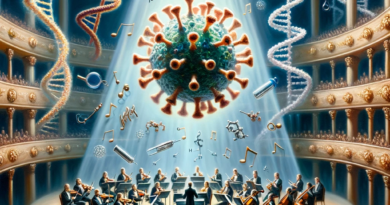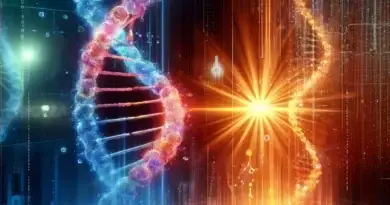Enzymes or Cells First? Life’s Origins Debate

What came first: enzymes or cells? This question isn’t just a scientific curiosity; it’s central to understanding how life began on Earth. Unlike the classic chicken and egg scenario, this debate holds clues to the very building blocks of life.
At its core, the discussion focuses on whether simple biological catalysts, known as enzymes, existed before cells, or if cells came first. Enzymes speed up chemical reactions in living organisms, while cells are the basic units of life. Solving this mystery is like finding a missing piece in a vast puzzle that spans billions of years.
The Enzyme-First Hypothesis
Supporters of the enzyme-first hypothesis argue that life started with these simple catalysts. They believe enzymes could initiate essential life processes, even without the structured environment of a cell.
Why is this idea significant?
- Simpler Beginnings: Some enzymes can function under basic conditions.
- Catalysts for Life: Enzymes might have sparked complex reactions leading to life.
Imagine a world where basic chemical reactions happen spontaneously, driven by natural catalysts. These enzymes could have set the stage for more intricate processes, eventually leading to the life forms we know today.
The Cell-First Hypothesis
On the other hand, the cell-first hypothesis suggests that life began with the formation of primitive cells. These early cells acted like tiny factories or containers, where chemical reactions could occur in an organized way.
Key Points:
- Protective Environment: Cells provide a stable space for reactions.
- Balance Maintenance: The inside of a cell is crucial for life’s processes.
Think of early Earth as a harsh and unpredictable place. In such conditions, developing a protective cell membrane could have been essential. This membrane would create a safe environment, nurturing the complex chemistry needed for life and shielding it from the outside world.
The Idea of Co-Evolution
A third perspective, known as the co-evolution theory, proposes a middle ground. It suggests that primitive cells and enzymes evolved together in a synergistic relationship.
Understanding the Partnership:
- Mutual Support: Cells offered protection, while enzymes enhanced reactions.
- Joint Evolution: Both evolved together, becoming more complex over time.
Visualize this as a collaboration. Early cell structures and enzymes worked hand in hand. The cells provided a haven for chemical reactions, and the enzymes boosted these reactions, helping both to evolve into the sophisticated forms of life we see today.
Advancements in Understanding Life’s Origins
Recent scientific advancements have reignited interest in this ancient question. Researchers worldwide are using cutting-edge technology and new methods to unravel the mystery.
Current Efforts Include:
- Simulating Early Earth: Laboratories recreate ancient Earth conditions.
- Observing Organic Molecules: Scientists study how simple molecules behave under these scenarios.
- Interdisciplinary Research: Combining biology, chemistry, geology, and even astrophysics.
By experimenting with chemicals and environments similar to early Earth, scientists gain insights into how simple molecules might have evolved into complex life forms. These experiments often lead to surprising discoveries, offering glimpses into possible pathways life may have taken billions of years ago.
The Broader Implications
Understanding whether enzymes or cells came first has far-reaching implications.
Why Does It Matter?
- Fundamental Questions: It touches on the very nature of life and existence.
- Guiding Space Exploration: Insights can help in the search for life on other planets.
- Advancing Technology: Discoveries may inspire new technologies in biotechnology and other fields.
This topic challenges us to think deeply about what life truly is and how it began. It pushes the boundaries of our understanding and encourages exploration of the unknown.
The debate over whether enzymes or cells came first remains vibrant and evolving. It reflects science’s core goal: a constant quest for knowledge about the world and ourselves. As we continue this journey, each discovery brings us a step closer to understanding the incredible story of life’s origins.
Related Articles
- https://academic.oup.com/biohorizons/article/doi/10.1093/biohorizons/hzx017/4693744
- https://onlinelibrary.wiley.com/doi/10.1002/smll.202106624
- https://www.pnas.org/doi/full/10.1073/pnas.0912628107
Keywords
Origins of Life, Enzyme-First Hypothesis, Cell-First Hypothesis, Co-Evolution Theory, Life’s Beginnings, Early Earth, Biology, Evolution
Disclaimer: The information presented in this article is for educational purposes and reflects current scientific theories and research. For detailed information, please consult original research papers or a qualified professional.



